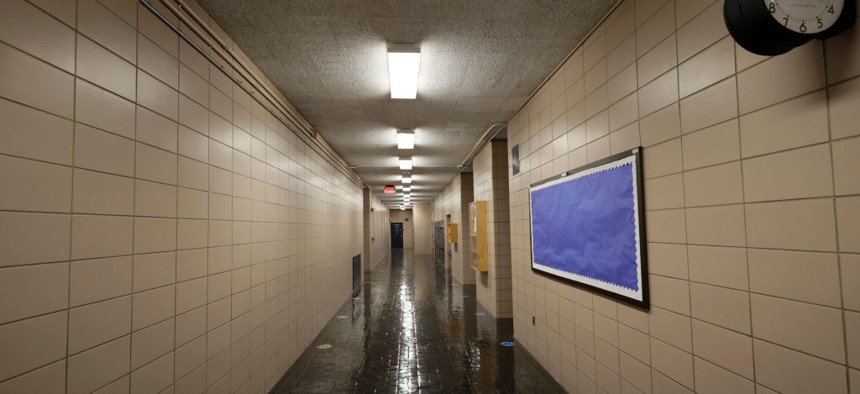Nonprofits
What’s behind declining enrollment in NYC schools?
A new Manhattan Institute report argues for greater acknowledgment of parents’ autonomy in the governance of district-run schools

Photo by Michael Loccisano/Getty Images
The Manhattan Institute has released an education report addressing declining levels of enrollment in New York City schools, stemming from socio-cultural disagreements over the purpose of education. The report indicates several policy issues that have been exacerbated by the COVID-19 pandemic and suggests recommendations to policymakers for a more pluralistic and responsive approach to education with a heightened interest in maintaining parents’ autonomy and choice in the governance of district-run schools.
NYN Media spoke to Ray Domanico, the institute’s senior fellow and director of education policy, on the importance of parental inclusivity in meeting the educational needs of students across New York City and state.
This interview has been edited for length and clarity.
In the education report, you focused a great deal on acknowledging the interests of parents in district-run schools. Why is it important to maintain this population of families and their freedom to have a greater say in their children’s education?
The main thrust of this report was an argument in favor of changing the way we think about education. My starting point is the observation that all types of schools, whether they are Department of Education schools, charter schools, or private religious schools, provide both public benefit and collective benefits, but too often we lose sight of that goal. We've seen here that enrollment in both the city and state schools—all sectors are down. The state of New York is losing families and the (enrollment) in city schools is down a goodly amount since the onset of COVID but this trend predates COVID. The reasons are multiple: the price of housing for families, concerns about public safety and other explanations. I think part of my position is to rebalance the debate. If the city or any entity pushes to promote a broader public agenda that individual parents feel are taking away things from their children, some people will leave the system.
How is a state’s emphasis on college readiness as the primary requirement for secondary education a source of friction among parents?
The emphasis on [college readiness] is an issue. Parents are a wide variation on this right in New York City. The question here is, what does a high school diploma indicate? There was this notion that the only high school diploma that's worth anything in the modern economy is one that indicates that the child is ready to enter college without the need for remediation. And so by setting more stringent requirements on annual tests across the state, fewer students are now deemed to be professional. My argument is that it's all tied to this single notion of college preparedness outcome. I think we're being unfair to kids. I'm encouraging them (policymakers) to recognize that there are other valid outcomes than preparing for the workforce, known as ‘opportunity pluralism’. I see a disturbing trend in the governance of schools nationwide: a cultural war going on about schools. Local councils in New York City too often see their role as selling the administration's agenda to parents, as opposed to acting as a mediator between the demands of the parent and community. And I think there's an obligation to listen to the parents who are opposed. I wish both sides would step back from the battle and try to find ways to work together.
In the report you mentioned the criticism that Orthodox Jewish schools received for serving curriculums that did not align with the Department of Education’s requirements. How does this conflict of interest between religious parents and the public education exemplary of the issue of wanting a common curriculum across the city?
The complicated truth is that different families, different individual children need different things and with the push towards standardization, we're losing sight of that. When you bring the religious aspect into it, we do have large numbers of Orthodox Jewish people, some of whom believe that in order to practice their own faith, they need to send their sons to school in which Jewish studies is paramount. Again, we're looking for a balance. The state does have the right state laws to ensure that private or religious schools have a curriculum that is actually equivalent to that of public schools. But how many schools are actually in violation? If there's a problem, the solution should be targeted to only those schools that have the problem. The Board of Regents is heavy handed in requirements they put on these schools.
As a solution you suggest reinforcing a system of school autonomy, as the best way to balance public interest and those of the parents. How do you suggest that the DOE go forward with this and what conflicts do you anticipate will arise?
Autonomy has to come with school choice. When you allow education pluralism, you have variation across schools. I think on the question of the conflicts, my belief is that giving more parents more choice will alleviate some of the conflicts. In requiring a ‘one size fits all approach’, you bring conflict on these issues because people have various views and with respect for the dignity of all human beings and children, there needs to be some acknowledgement that we're going to allow that in the schools. You have to show them that in any democratic system, any system of government run schools, there are going to be political compromises that are made or even at the best of morals. We need more deliberative, respectful dialogue between parents and the community and educators.
NEXT STORY: Nonprofits take action after loss of Roe v. Wade
